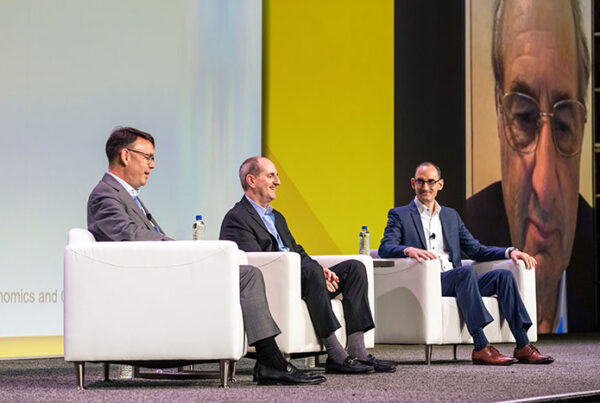Though people in a handful of countries around the world—not least the United States, United Kingdom, and Israel—may now feel that the worst is over when it comes to the COVID-19 pandemic, economic uncertainties and even perils still await if governments and industry let down their guard. That, was the message from Mohamed A. El-Erian in his keynote address to the 2020 ULI Virtual Spring Meeting.
While no one in countries where vaccination is proceeding apace wants to be anything other than optimistic after the past year, El-Erian’s credentials are impressive enough that his warnings should be taken seriously. He is the president of Queens’ College at the University of Cambridge and since 2014 has been chief economic adviser at Allianz, the corporate parent of PIMCO, where he formerly served as chief executive and co-chief investment officer.
“Ironically, while all of us feel that we’re coming out of this dark tunnel—and it has been very dark—we still have an uncertain journey,” El-Erian told the online audience. “It is critical that we do not repeat the mistake of 2008. We won the war against a global depression, although we came close to one, but we didn’t establish high, sustainable, and inclusive growth.”
.@Allianz‘s Chief Economic Advisor, @elerianm, opens our second general session of the day, discussing long- and short-term impacts of COVID-19 on the #economy and how this affects our current economic path, as well as sharing his #vision for a renewed #globaleconomy. pic.twitter.com/ARazRxRsOM
— Urban Land Institute (@UrbanLandInst) May 11, 2021
The result of weak growth in most economies after the global financial crisis was that they entered the COVID-19 crisis with less resilience than they should have, El-Erian said. Consequently, as countries seek to build their way out of the current emergency, governments and companies need to ensure that they have sufficient fiscal and financial firepower to cope with an unexpected setback.
“It’s really important [that] that mistake should not be repeated,” said El-Erian. “We need to acknowledge that consistently good decision-making in this world is hard; the probability of a mistake is high. No one wants to make a mistake, but there’s simply too much fluidity in the system. So, understanding your recoverability from mistakes is really, really important. Minimize mistakes, but also understand the nature of the mistakes you’re open to.”
The point, El-Erian added, is underlined by the fact that few organizations, be they public or private, initially understood how long the pandemic would last. “When we entered COVID-19, the thinking was, ‘This is a one-time shock, and we’re going to come out of it,’” he said. “COVID-19 was thought to be like the financial crisis—a one-round game where you get hit hard, you respond, and you move on.”
He added, “Like poker, everything goes in this one hand and that’s it; you do whatever it takes. Well, it turns out that COVID-19 is not a one-round game; it is a multi-round game. If you’re the U.S., you’re able to deal with multi-round games, but other countries are not. So, that is going to become more of an issue for countries and for segments within countries.”
In particular, El-Erian is concerned about the potential that the multi-trillion-dollar U.S. stimulus package will trigger significant inflation, evidence for which is already apparent. “The Federal Reserve believes very strongly that it will be transitory,” he said. “They are absolutely committed to maintaining the loosest financial conditions we’ve had.”
The U.S. government, El-Erian added, clearly believes that such stimulus is necessary in a multiplicity of different ways, but he worries that it could yet be proved hubristic. “What if the Fed is wrong?” he asked. “On the demand side, you can no longer argue that we have a deficiency of aggregate demand. Public-sector demand is on turbo charge, and the private sector has one of the strongest balance sheets, on average, that it’s had for a long time.”
On the supply side, however, El-Erian argued that the situation is markedly different. “Companies cannot find workers, so the supply side is much less agile than we need it to be right now,” he said. “There are massive supply bottlenecks, prices are at all-time highs for certain commodities, and there are persistent inventory shortfalls. So, there is much more pricing power.”
He added, “However, the policymakers are not there. So, what should happen is to soft land this economy into a path of higher sustained, sustainable, and inclusive growth. You need a much more comprehensive policy approach, one that speaks to both the supply side and the demand side.”
El-Erian added that he does not think governments should cut back on infrastructure spending anytime soon. Such spending is low risk from an inflation standpoint, he said, and should result in higher economic growth in the medium to long term.
“I sort of think of it as a car analogy,” El-Erian said. “Right now, we have pedal to the metal on monetary policy, we have pedal to the metal on fiscal policy, and we have hardly anybody applying any pressure on prudential policies. That is a recipe for disaster. “What you really need to do is maintain the pedal to the metal on the infrastructure because I think that actually is going to increase productivity. But you need to slowly lift your foot off the monetary stimulus accelerator, and you need to stop pressing harder on potential regulation.”

